It has taken almost two years for a major company in the finance industry to take a concrete but very small step towards preventing the recurrence of the pointless death of one of the industry’s potential bright stars.
The Guardian reported on 18 June that Goldman Sachs – “one of Wall Street’s toughest firms” – has limited the working hours of its interns to 17 hours a day. That’s seven days a week, not five.
It seems that university business and finance students compete to get intern positions in such firms during their summer holidays. Then they compete for future jobs by showing their devotion to the firm by working all night, repeatedly.
On 15 August 2013, Moritz Erhardt, an intern at Bank of America Merrill Lynch in London, died after 72 hours without sleep, or even a break longer than was necessary to go to his flat, shower and change clothes. He died in his shower. The inquest could not find an exact cause of death, but Erhardt had a mild epileptic condition, and he may have drowned in the shower during a seizure brought on by exhaustion. He was 21 years old.
According to Erhardt’s father, who was interviewed by the Guardian, Moritz “wasn’t just interested in the money. He wanted to do good in the world. I’ve been sorting through some of his things and I found a quote from Marilyn Monroe he’d made a note of which went, ‘I don't want to make money, I just want to be wonderful’”.
Erhardt was apparently thinking of a career as a management consultant and then doing charity work. A very bright young man, he was one of two out of 1,500 applicants selected as Bank of America Merril Lynch’s summer 2013 interns.
Erhardt’s father didn’t blame the firm for his son’s death. “He can imagine”, the Guardian reported, “that part of what Moritz loved about the work was the intensity and the esprit de corps that developed during those long days and nights in the office. He compares it to the endorphin rush experienced by long-distance runners or mountaineers who push themselves to climb further without oxygen. The bank wasn’t exploiting his son, he insists. Instead, “Moritz ‘was exploiting himself’”.
Extreme physical exertion causes physiological changes, some of which can be felt by the brain as pleasant or stimulating. But that doesn’t determine which exertions anyone chooses or is compelled to perform.
So what made Moritz Erhardt exploit himself to death?
The inquest determined that Erhardt died of “natural causes”. The language is revealing. In capitalist society, working and overworking until it kills you is “natural”.
The kind of self-destructive competitiveness that killed Erhardt is probably seen more often in young people, especially young males. Hormone and energy levels may partially explain that. But there is another, more important, factor that is seldom mentioned.
Young people are most subjected to the propaganda that portrays deadly levels of competition (especially among males) as natural and desirable, as a way of becoming wonderful. They are constantly bombarded with the idea that “you can be anything you want to be” – as long as you please the boss.
The intensive propaganda is necessary because it’s not true. There is nothing at all “natural” about the competition in capitalist society.
The incident also tells us at least one other thing. Most of the other 1,498 internship applicants received a wake-up call that it is not so easy to be “wonderful” in capitalist terms. Overwhelmingly, they must have been people who have the best chance of “success” in the capitalist economy (aside from those born with money): accepting of and loyal to the system, intelligent, trained in the skills the system wants.
But the longer capitalism lasts, the less room there is at the top. The logic of capitalism is ever more accumulation of wealth by a shrinking proportion of the population, and the exclusion of everyone else, even those who show themselves willing to die for the system.











